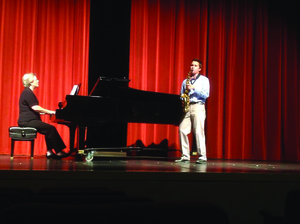

Vicki Fey accompanies Clay Fissel.
Clay Fissel wanted to be a percussionist when he was in the sixth grade. Before that he tried guitar and piano. However, he found his love when he picked up an alto saxophone.
"Growing up, I always loved music," Clay says. "Singing was one of my earliest passions. I tried my best to learn guitar, drums and piano to no avail, so saxophone was the first instrument I formally learned, beginning in the sixth grade, with private lessons. I pride myself in my ability to play both jazz and classical saxophone, and have devoted intense study to both styles. Also picking up other instruments seemed to come much easier after I started saxophone, and I have been heavily involved in church music ever since.
"When I first moved to Tennessee, my parents would take me to every Milligan jazz concert that we could make. I walked into band initially wanting to be a percussionist like most other sixth grade boys, but that dream was shot down rather quickly. My fall-back was actually the tenor saxophone. When I arrived at the music store to buy a tenor, the shop manager looked at my small stature and had me try an alto instead. I put the horn to my mouth and played some of the worst sounding notes I have ever played, but from that point on I knew I was destined to play the saxophone. I not only play the alto saxophone, but have played most of the saxophone family in various ensembles, and have also picked up guitar, bass, mandolin and cajón (a percussion instrument) along the way."
Clay loves how music connects people to memories and emotions. "It is a very powerful medium of expression," Clay says. "Music to me is a constant source of wonder. It is amazing how simple sound vibrations can create such an effect on an audience; I love how simple changes can transform the meaning of a piece. It transcends my ability to comprehend it; therefore, as long as there is music to perform, I will never grow bored.
"My main approach to music is to convey what the composer intends to say in a piece. Precision alone, though important, falls short of expressing what the music truly is trying to say. I love to focus on the aspects that stretch far beyond the page.
"Luckily, I have surrounded myself with great teachers who stress the unwritten subtleties as much as the written music. As a result, I feel it allows for a greater connection with the audience, thus allowing for a greater performance."
His major influence is his private teacher of the past year and a half, Tom Crawford. "Without him, I would not be on the level that I am now. My main performer I aspire to be like is Marcel Mule, one of the biggest pioneers in classical saxophone."
His favorite composition is "Ma Vlast (My Fatherland) Vltava (The Moldau River)." He is a huge fan of the composers Rossini, Holst, Frank Ticheli and David Holsinger, whose compositions have been some of his favorite pieces of wind band literature.
Clay placed second in this year's Bristol Music Club scholarship competition, and says, "It served as a validation for my decision to pursue a career in music." He has also competed as part of a quartet in the Fischoff Chamber Music competition, narrowly missing the quarterfinals. He has also participated in East Tennessee State Band and Orchestra Association's All-East band for the past two years, and played in the top band for 11th and 12th graders this year.
Clay plans to get a doctorate and perform in one of the nation's military bands and eventually teach saxophone and potentially music theory on the collegiate level.
He is 18 and the son of Brad and Andrea Fissel. He attends Lee University, Cleveland, Tenn.